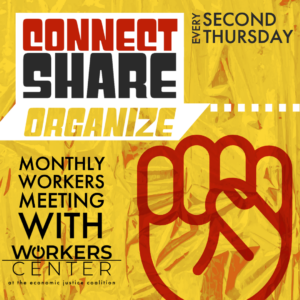Recently, while tabling at an event in Athens, we met a young worker who shared that they were being paid under the table at less than minimum wage at their job as a dishwasher in a national chain restaurant. While this might seem shocking to some, this type of wage theft is all too common among low-wage workers, with immigrant workers being among the most abused by these practices from their employers.
…a Center for Public Integrity analysis of Labor Department and U.S. Census Bureau data found that industries with higher percentages of foreign-born workers had higher rates of wage theft.
Center for Public Integrity
So what exactly is wage theft?
When an employer fails to give their workers their earned wages, they are stealing labor from their employees. Some of the most common forms of wage theft include:
- Minimum Wage Violations: In Georgia, the minimum wage matches the Federal minimum wage at $7.25/hour. If you’re being paid less than that, you are likely owed money from stolen wages.
- Overtime Violations: Once you reach 40 hours of work each week, you are entitled to earn 1.5 times your regular wage for each hour over 40 hours.
- Paycheck Violations: If your employer is giving you your paychecks late, or there are incorrect deductions on your check, or if you aren’t receiving your check at all, your employer is stealing from you.
- Hours Worked Violations: If you are working during windows of time where you are not clocked in or if you are not receiving pay for all of the hours that you are working, you are owed money by your boss.
- Tip Violations: If your employer is taking illegal deductions from tips or forcing tip-pooling with non-tipped employees, there’s a good chance you’re owed some money!
- Employee Misclassification Violations: A common tactic is for employers to classify workers as “independent contractors” when they’re actually employees — this tactic is one way employers avoid requirements for withholdings and attempt to strip legal protections away from workers. The US Department of Labor has a quick and simple guide to see if you’re being misclassified.
So what can you do if you think you might be owed money by your employer?
Any worker who believes they have had their wages stolen is entitled to file a complaint — even if you don’t have work authorization or legal status!
Your best protection from wage theft is being proactive in keeping records on your work and your wages. These are all important documents to hang on to, make copies of or even just pull your phone out to snap a picture:
- Written employment contracts
- Employee handbooks/manuals
- Job listings/advertisements
- W-2s or 1099s
- Paychecks or written records of payments
- Timesheets or logs of your work schedule
- Any letters, texts, voicemails or emails exchanged with your employer related to your job
Sometimes, just knowing that you are owed money and being educated on how to bring this topic up with your employer is enough to get you the money that you’ve earned. A Workers Center can offer support as a third-party either assisting the worker in recovering wages from the employer. In these cases, having a third party as a mediator can sometimes increase the odds that the employer will do the right thing and pay the worker their wages. In some instances, when an employer is still resistant to following the law, collective action or being connected with legal support is the escalation.
The Workers Center at EJC is ready to help you navigate this process. You can complete an intake form here and start the process of getting all your earned wages!





